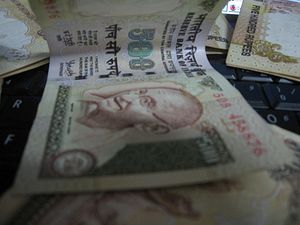Recently, India-Nepal relations have come under scrutiny over the demonetized Indian currency sitting in Nepal. An official study estimates that Nepali banks, financial institutions, and individuals hold more than 7 billion rupees (about $108 million) worth of banned Indian notes. Indian currency, although not legal tender, is widely circulated and accepted in Nepal. The fact that Nepal shares an open border with India and does most of its trade with India has contributed to wide acceptability of Indian currency in Nepal. Considering Nepal’s close economic ties with India, India’s own Foreign Exchange Management Act (FEMA) has also permitted individuals in Nepal to legally carry up to 25,000 rupees (approximately $350) worth of Indian currency in 500 and 1000 rupee notes.
Nepal has long demanded that India allow its citizens to exchange up to 25,000 rupees worth of demonetized Indian notes and to swap another 33.6 million rupees (approximately $468,000) currently with banking channels. India, however, has not shown any signs that it will entertain Nepal’s request. In recent months, Indian officials have blamed counterfeit notes and have used the prospects of Indian “black money” coming back into India through Nepal as reasons for their reluctance. However, these concerns lack credibility. It may be true that some fake Indian currency might be in circulation in Nepal. However, a logical solution is readily accessible: India can ask Nepali authorities to verify the authenticity of the notes before turning them into India, and India can even verify the authenticity of notes unilaterally before exchanging the equivalent. With regards to Indians exchanging their black money from Nepal, Indian officials should know that Nepal’s central bank — immediately after the notes were banned in India — issued a directive to financial institutions to stop exchanging Indian notes of high denominations. If India were to take its banned currency back, the government of Nepal is more than capable of developing software that could track its citizens’ currency exchanges, making it nearly impossible for Indians to exchange their banned currencies through Nepal.
The Indian government’s reluctance to exchange banned notes from Nepal has more to do with Indian domestic politics than anything else. It should be noted that initially, India was willing to provide Nepal with exchange facility for its banned notes. In March 2017, a high-level delegation from the Reserve Bank of India (RBI) visited Kathmandu to discuss the exchange facility with Nepali counterparts. As late as March 2018, then-Finance Minister Arun Jaitley was still assuring Nepal that it would soon get exchange facilities for the demonetized Indian notes. However, India closed off the possibility of exchanging banned Indian notes from Nepal when the RBI released its 2017-2018 annual report in last August, removing the part from its 2016-2017 report which had stated that banned Indian notes from Nepal had not yet been returned. The reason why the Indian government changed its mind lies in the same 2017-18 RBI report. The report states that 99.3 percent of demonetized notes returned to the formal banking system, indicating that almost all money came back, and that demonetization was virtually unsuccessful in freezing out black money. Should India have taken its banned currency from Nepal, the total amount returning would have been even higher, further debunking government assertions that demonetization was essential for hitting black money. With the Indian general election just a few short months away, it was easier for the Modi administration to deceive its weak neighbor than exchange currency that would further demonstrate the failure of their policy.
India’s deception of Kathmandu might have played well for the Modi administration, but it has pushed Nepal more toward China. The anti-India sentiment in Nepal is at an all-time high, and there are reports that demonetized Indian currency in Nepal has played a role in influencing Nepai voters to vote out pro-Indian politicians, resulting in the victory of pro-China parties during the last election. Further, for the first time in decades, policymakers in Kathmandu are discussing the prospects of ending Nepal’s one-way currency pegging with Indian rupees. Currently, Nepali rupees are pegged with Indian rupees, forcing Nepal to calculate its economy in terms of the Indian economy.
As a result, it is in the best interest of Nepal for the Indian economy to perform well, further deepening Indian influence on Nepal. The easiest thing Nepali policymakers can do to kill current currency pegging is simply to intensify economic engagement with China. The current government in Kathmandu is doing exactly that. Nepal has recently signed $2.4 billion in connectivity and infrastructure deals with China, which include linking China to Kathmandu through Himalayan railways. Further, Nepal and China also reached an agreement recently on a deal that provides Nepal access to Chinese seaports and land facilities for trade, further relieving Nepali dependence on India. In the future, if Nepali policymakers become successful in killing the current currency pegging, Indian products will become more expensive in the Nepali market as Indian rupees will appreciate greatly over the current fixed rate. This will make it even easier for Chinese products to compete with Indian goods.
Prime Minister Narendra Modi campaigned on the slogan “neighborhood first” during his first term in office, but through various diplomatic blunders, he has ended up alienating Nepal, India’s neighbor and one of its closest allies. Now that he has been re-elected, Modi should consider policies to re-win Nepal’s trust. Exchanging banned notes from Nepal can be a good first step. However, it is not just about a couple billion rupees; it is about restoring and maintaining the mutual trust that has been built over by generations.
Sumesh Shiwakoty is a commentator on Nepali affairs. Previously, he worked with the World Policy Institute in New York and has received a research grant from the Andrew W. Mellon Foundation.
































